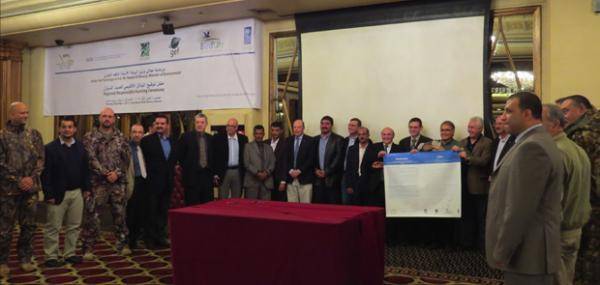OSME is pleased to learn that progress is being made on
developing an approach to sustainable hunting in the Middle East. A full report
is available at
http://www.birdlife.org/middle-east/news .
. .
Hunters from Lebanon, Jordan, Syria, Palestine, Egypt, Yemen and Ethiopia have
signed a Regional Declaration on Responsible Hunting [1], at a ceremony
organised by the BirdLife International and UNDP/GEF Migratory Soaring Birds
(MSB) project in coordination with the Society for the Protection of Nature in
Lebanon (SPNL), BirdLife in Lebanon.

Prominent
hunters from Middle East and Africa
Under the Patronage of H.E. Mr. Nazem El Khoury, Lebanese Minister of
Environment, the ceremony celebrated the adoption of the “Code of Best
Practices for Hunters and Hunting Groups for Responsible Hunting and the Full
Protection of Migratory Soaring Birds”.
The ceremony was held on the 5th of December 2013 at the Coral Beach Hotel, Beirut, Lebanon. Guests included responsible hunters from the region, and observers from the Lebanese Higher Hunting Council, BirdLife International and BirdLife Partners from attending countries, the Lebanese Ministry of Environment, the European Federation of Associations for Hunting & Conservation (FACE), and the United Nations Development Programme (UNDP).
The ceremony was part of a larger scheme that the MSB project discussed back in October 2011, during the MSB first regional hunting workshop in Beirut, when BirdLife Partners reviewed hunting practices in the region against the background of European experience. In Europe, BirdLife has signed a similar agreement with FACE.
Dr. Saleem Hamadeh, representative of H.E. Mr. Nazem El Khoury Lebanese Minister of Environment, presented the accomplishments of the Ministry of Environment in terms of birds conservation and the issuance of the necessary decrees for the implementation of the new hunting law. He reminded that migratory birds are protected under international laws and conventions. Finally he stated that “to achieve complete protection of migratory soaring birds we need regional collaboration for the organisation of responsible hunting”.
Signatories of the Responsible Hunting Declaration have committed to adopt the Code of Best Practices for Hunters and Hunting Groups for Responsible Hunting and the Full Protection of Migratory Soaring Birds as the founding principle of their hunting activities, and to implement measures to conserve migratory soaring birds and their habitats.
Many of the hunters present have expressed their aspiration to create national responsible hunting groups and societies with the Code of Best Practices for Responsible Hunting as their core value.
Mr. Osama Al Nouri, Regional MSB project coordinator, declared: “The MSB project aims to revive the hunter’s traditional sustainable hunting practices that do not threaten migratory soaring birds along the Rift Valley/Red Sea flyway within the scope of the Code of Conduct, to establish national and regional mature responsible hunting groups that are working closely with BirdLife partners as allies against indiscriminate practices, and ensure firm government buy-in through effective regulations and efficient implementation of national laws”.
Participating BirdLife Partners were:
The
Society for the Protection of Nature in Lebanon (SPNL), BirdLife Lebanon
The Royal Society for the Conservation of Nature ( RSCN), BirdLife Jordan
Palestine Wildlife Society (PWLS), BirdLife Palestine
Ethiopian Wildlife and Natural History Society (EWNHS), BirdLife Ethiopia
The Syrian Society for the Conservation of Wildlife (SSCW), BirdLife Syria
Nature Conservation Egypt ( NCE), BirdLife Egypt
Foundation for Endangered Wildlife in Yemen (FEW)
For more information on the Code of Best Practices for Responsible Hunting
kindly visit the MSB project website: www.migratorysoaringbirds.undp.birdlife.org or
contact the BirdLife’s Regional Flyway Facility at rff@birdlife.org
